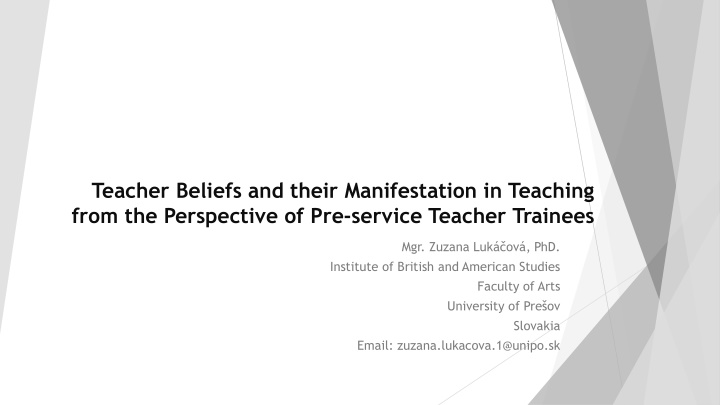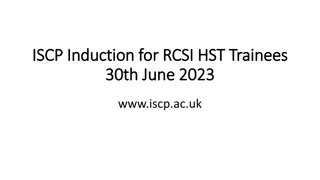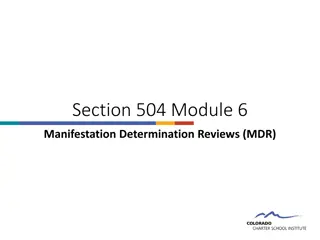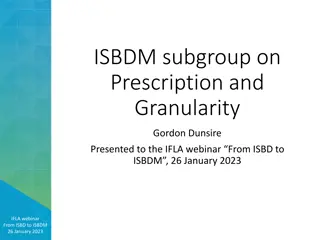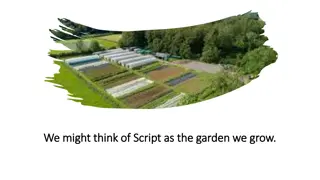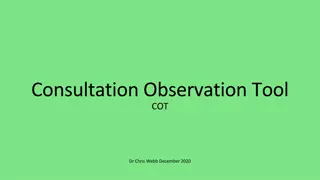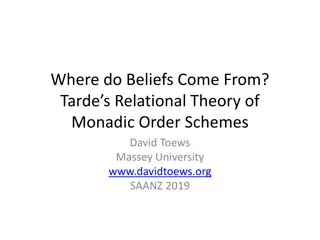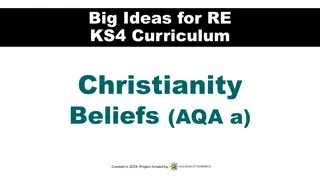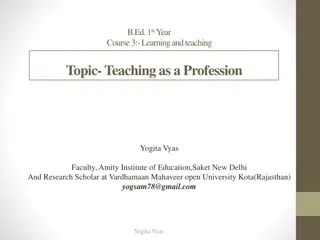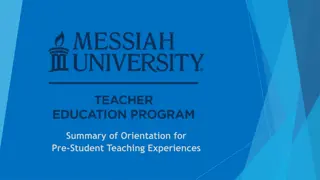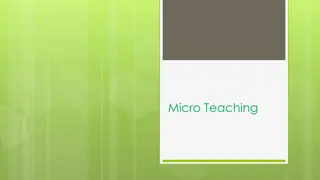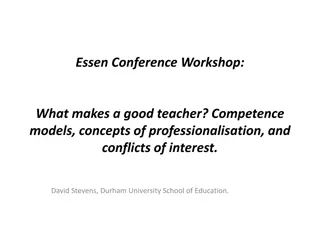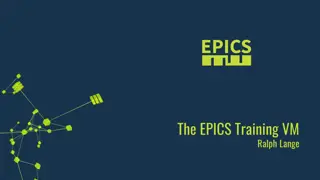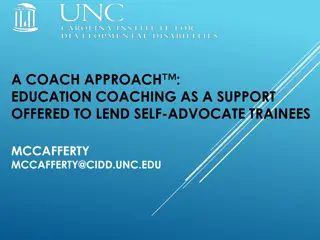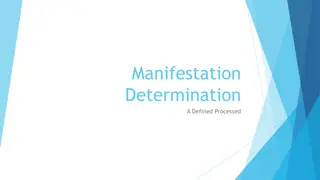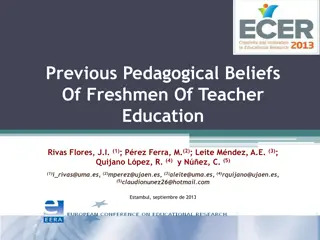Teacher Beliefs and Manifestation in Teaching: Insights from Pre-service Trainees
Delve into the intricate world of teacher beliefs and their impact on teaching practices through the perspectives of pre-service teacher trainees. Explore how these beliefs shape classroom behaviors, curriculum design, and self-reflection in the teaching profession. Discover the factors influencing the formation of teacher beliefs and the methods utilized by trainees to enhance the learning process.
Download Presentation

Please find below an Image/Link to download the presentation.
The content on the website is provided AS IS for your information and personal use only. It may not be sold, licensed, or shared on other websites without obtaining consent from the author.If you encounter any issues during the download, it is possible that the publisher has removed the file from their server.
You are allowed to download the files provided on this website for personal or commercial use, subject to the condition that they are used lawfully. All files are the property of their respective owners.
The content on the website is provided AS IS for your information and personal use only. It may not be sold, licensed, or shared on other websites without obtaining consent from the author.
E N D
Presentation Transcript
Teacher Beliefs and their Manifestation in Teaching from the Perspective of Pre-service Teacher Trainees Mgr. Zuzana Luk ov , PhD. Institute of British and American Studies Faculty of Arts University of Pre ov Slovakia Email: zuzana.lukacova.1@unipo.sk
Table of Contents Definition of Teacher Beliefs Teacher Beliefs as a Part of Teacher Formation Data Collection Research Sample Data Analysis and Research Findings Conclusion
Definition of Teacher Beliefs a considerable amount of literature has evolved around teacher beliefs and their role in the classroom behaviour of teachers (Borg, 2001; Gilakjani Sabouri, 2017; Devine et. al, 2013; Holt- Reynolds, 2000) Definition of the concept of belief: ... A belief is a proposition which may be consciously or unconsciously held, is evaluative in that it is accepted as true by the individual, and is therefore imbued with emotive commitment; further, it serves as a guide to thought and behaviour... (Borg, 2001, p.186)
Teacher Beliefs as a Part of Teacher Formation Calderhead (1996) recognises five types of teacher beliefs, which are the following: beliefs about learners and learning, teaching curriculum, learning to teach about the self the nature of teaching (as cited in Gilakjani Sabouri, 2017, p. 79). According to Devine et. al (2013), an understanding of (dis)congruence between teacher beliefs and teacher practices is critical in researching teacher effectiveness as it underscores the multifaceted and often messy relationship between what teachers do and what they believe, in contrasting cultural and social contexts (p. 85).
As Holt- Reynolds (2000) claims, the position of a teacher has changed, i.e. teachers are no longer only a source of information, but are required to actively cooperate with students and enhance their participation in the process which is then enriched with teachers teaching. FACTORS which can affect the formation of teacher beliefs: Own experience as language learners Experience of what works best Established practice Personality Factors Educationally based or research-based principles (Richards and Lockhart, 1995, p.30)
Aim to investigate the previous school experience as one of the factors affecting the teacher beliefs formation to explore the pre-service teacher trainees beliefs about teaching To examine the specific methods and techniques used by the teacher trainees in order to make the learning process in the classroom effective
Data Collection qualitative research approach to help understand how teacher beliefs are reflected in teaching semi-structured interviews were conducted as a part of the feedback session during teaching practice. QUESTIONS: 1. Have your experience of being a student at primary / secondary level had an impact on the formation of your teacher beliefs? If yes, then how? 2. What are your teacher beliefs, i.e. what is it that you believe in as a teacher and try to reflect it in your teaching? 3. What methods / techniques are you trying to implement into your teaching to make the learning process effective?
Research Sample the sample of ten pre-service teacher trainees of teacher training programme at master s degree The participants had been through teaching practice experience aged approximately between 21-23
Data Analysis and Research Findings 3 categories recognised: Previous Student Experience What we think Teacher beliefs What we believe in Effective Teaching What we do
Previous Student Experience What we think being a student was considered as a completely different position than being a teacher: I1: I from the student's point of view we looked at it as if it was nothing, just come to class and teach. And now I can see what it is all about I really appreciate them more and also what they were doing. teachers can act friendly towards the students without being afraid of losing their respect and authority: I2: I liked it when teachers were friendly and did not boost their ego on pupils ... so I am also trying to do it that way ... What I appreciated about my teacher was her being friendly.
There were some suggestions that school experience with former teachers role models has played a key role in the career decision process: I5: At upper-secondary school I liked our Slovak and English language teacher and because of her I have decided to study what I am studying. So I can say that because of some role models. I think this has had a great impact on me. Not only positive, but also a negative role model has helped the trainees realise what they do not want to or what they want to avoid doing as future teachers: I8: ... to compare or reflect on something backward what I have experienced as a student at secondary school, I started to realise during my master s degree studies that the teacher was sticking to the textbook all the time, ... but I think that it is not so good to stick to the textbook because it can quickly turn into a routine, and I am trying to avoid that.
Teacher beliefs What we believe in that teaching is not only about the process of giving and receiving knowledge, but it is more about whole-person learning and raising students, helping them on their way to become the greatest versions of themselves: I1: be sure not to focus just on the pupil gaining the knowledge, but also to affect them ... to raise them we should not be focusing only on covering as much content as possible The practical application of knowledge was emphasised, i.e. showing the students that what they are learning is truly meaningful: I9: I believe that what I am teaching is important and I want to transfer it to students so they also realise, that what I want to tell them and teach them, or what they are to learn will be applicable in the future, because that s the problem they have. They think that it is useless. So every lesson I am trying to make them realise that what we do is meaningful.
Some interviewees believe that learning equals fun, e.g. a language can be learnt without realising it: I4: Maybe the fact that they do not have to memorise some things, but I am trying make it more about fun, for instance a competition, to make learning fun and maybe also teaching English without them realising that they are learning. The majority of participants agreed with the statement that trust between a student and a teacher is necessary for creating a pleasant learning environment without fear: I5: I would like to get the respect, that is the key, but also to be friendly to the extent that they know if they have some kind of personal or family issue, they can come to me with no fear. I think this can mean years of practice, I know the respect cannot be built in 5-10 minutes, an hour, a week, so this is going to be challenging in my opinion. the relevance of open questions, avoiding the Halo effect and tackling students curiosity were emphasised: I7: I believe that a man is curious by their nature and can be interested in anything. So I believe that if something is presented in an interesting way, it may catch attention...
Effective Teaching What we do Personalisation was highlighted: I6: Whenever I can I am trying to combine it with ... with their life. I am asking or providing some examples from their life, when I am teaching something. That way they can remember it better, if they connect it with situations from their lives. Using visual aids, emphasising discovery learning I1: So I try to give them as much help as possible, such as visual aids, so that it is not only that we say something, write it, but they can also try it themselves and I also like when they can come up with something on they own and I don't have to say anything, but they deduce it somehow.
Engaging students as much as possible: I7: If I do not have to present a new content, I am trying to engage the students as much as possible. So that it is not just me speaking and them taking notes and memorising at home, but I am trying to engage them in the process itself, to make them learn during the lesson. Repetition: I5: ... maybe repetition ... for the lesson content fixation ... to recall it when needed. Getting feedback from the students I9: After every activity I am trying to get some feedback. I mean, I would like to do it after every activity, to find out if they were satisfied with the activity, whether it was helpful in some way, but that is more time-consuming. Mainly I am trying to let them speak most of the time and were more active than me. And I am just observing them.
Conclusion Previous Student Experience What we think A difference between a teacher and student s position, friendly attitude, former teachers positive and negative role models Teacher beliefs What we believe in Whole-person learning, practical application, meaningfulness, fun, pleasant classroom environment, the relevance of open questions, avoiding the Halo effect and tackling students curiosity Effective Teaching What we do Personalisation, visual aids, discovery learning, engagement, repetition, feedback
References Borg, M. (2001). Teachers Beliefs. ELT Journal, 55(2), 186-188, https://doi.org/10.1093/elt/55.2.186 Devine, D., Fahie, D. and McGillicuddy D. (2013). What is good teaching? Teacher beliefs and practices about their teaching. Irish Educational Studies, 32(1), 83-108, doi: 10.1080/03323315.2013.773228 Gilakjani, A. P., and Sabouri, N. B. (2017). Teachers Beliefs in English Language Teaching and Learning: A Review of the Literature. English Language Teaching, 10(4), 78. doi: 10.5539/elt.v10n4p78 Holt-Reynolds, D. (2000). What does the teacher do? Teaching and Teacher Education, 16(1), 21 32. doi: 10.1016/s0742-051x(99)00032-3 Richards, C. J. And Lockhart Ch. (1995). Reflective Teaching in Second Language Classroom. Cambridge: Cambridge University Press, ISBN 052145803X.
